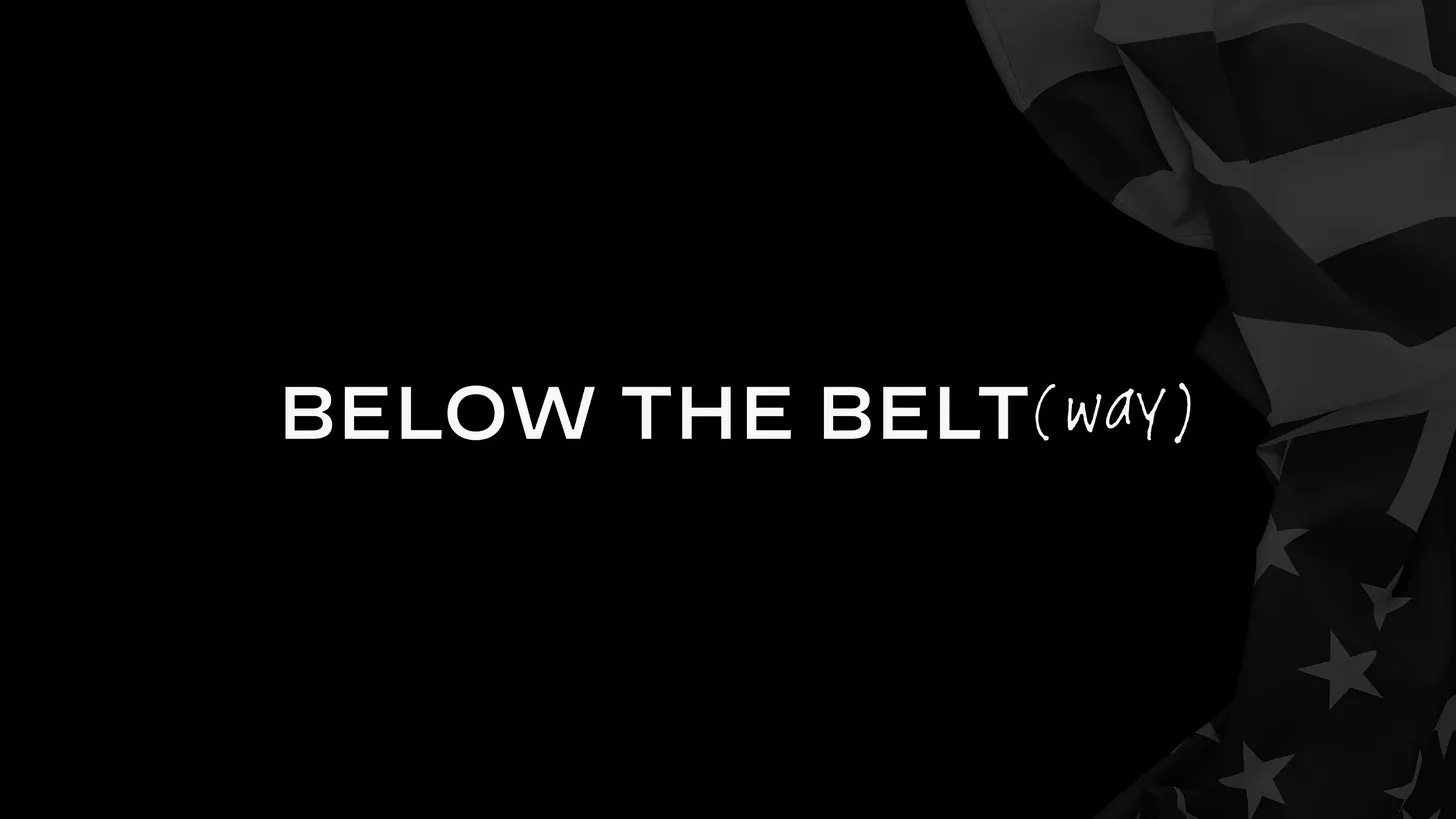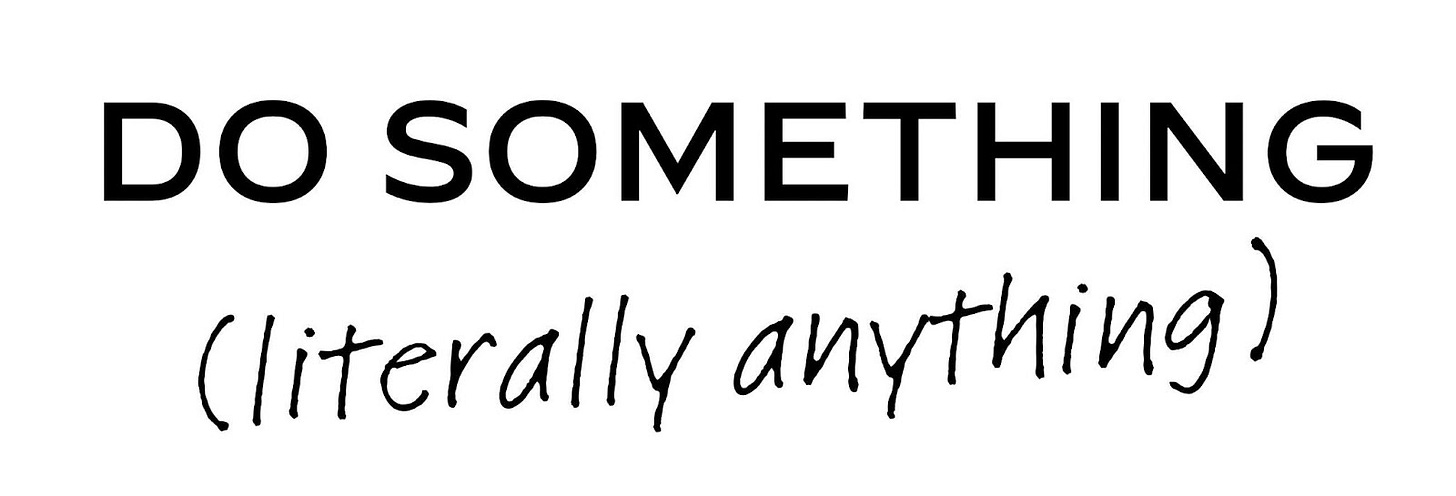Everglades internment camp used to siphon money to private companies
ALSO INSIDE: 1,6000 'Good Trouble' protests held nationwide on Thursday
Cam here 👋 bringing you your daily dose of what people are doing – good, bad, and otherwise – in the world of politics. We’re diving into the stories you won’t see anywhere else. And remember, you can also keep up with me over on TikTok and Bluesky.
And if you’re looking for a little more from COURIER, Akilah Hughes goes down the tradwives, MAHA, and Women’s Wellness Pipeline in the latest episode of “How is This Better?”
Editor’s Note: I’m still verifying sources for the story I had planned for this section of today’s newsletter — it has to do with a whistleblower’s account of 100,000 pages on Jeffrey Epstein that the DOJ reviewed in March.
It’s looking like that story won’t be ready until Monday, so for today, I’m going to re-run a story I published Monday on Rep. Maxwell Frost’s inspection of the internment camp in the Everglades:
What Happened
A list of convicted sex trafficker Jeffrey Epstein’s high-profile clients isn’t the only record the Trump administration is going to great lengths to keep hidden from the public. In an interview on Saturday, US Rep. Maxwell Frost (D-FL) revealed that the internment camp set up in the Everglades doesn’t file charges against detainees with state or federal courts.
Frost conducted a restricted congressional oversight visit of the camp, where he was not allowed to enter the tents, speak with detainees, or inspect the medical facility. He was able to briefly examine intake, where detainees are booked, and discovered something unusual: criminal charges against them aren’t being filed.
“When we were in the processing facility, we found out that the system that they're using to keep track of everyone is not the normal system that's used by the courts,” Frost explained. “They actually created a brand new system, just for this internment camp in the Everglades. And, of course, the whole reason they do this is to keep things off the books.”
Typically, after someone is arrested, they can only be detained for 24 hours before they receive their initial court appearance. During that time, prosecutors file formal charges with the appropriate court system, which is processed and made publicly available. Once charges are processed, the accused has the right to stand before a judge and have their day in court, as the US Supreme Court unanimously reaffirmed in Noem v. Abrego Garcia earlier this year.
This has caused problems for the Trump administration, which has had to facilitate the return of four people it illegally deported who had pending court cases. To get around the courts, the administration’s latest shadow president, Stephen Miller, now plans to have charges against immigrants dismissed en masse so they can take thousands out of the court system and deport them.
What Frost witnessed at the internment camp takes this a step further by cutting the courts out of the process completely for the newly abducted. People are processed with a private system and detained until they can be put on a plane, which Florida Director of Emergency Management Kevin Guthrie said would be no longer than two weeks.
The facility is built on a confusing combination of public-private partnerships, in a way that Frost said makes it difficult to implement oversight of any kind. The location is a federal site, but funded by the state, and staffed by private companies. The medical unit is run by a privately, and Frost counted guards from four different security companies handling everything from parking to security detail.
And with the prevalence of no-bid contracts by immigration agencies, the price tag for the public-private partnership in running the internment camp cost Floridians $450 million, just to get it up and running.
Since the camp has an airstrip onsite, once a person is taken into custody, the next time they leave will be on a plane out of the country, all without being charged with a crime. And according to records obtained by the Tampa Bay Times and Miami Herald, who obtained a list of over 700 people detained at the camp, hundreds of people being held have no criminal history whatsoever.
“What we're seeing happen — and this is outside of the centers as well, across the state of Florida —is essentially, someone is picked up for a minor traffic violation or a very small civil thing,” said Frost. “Or maybe they're just picked up randomly once they settle that with the state — they pay the fine, they do whatever — then they just disappear from the system, because they're put into the hands of ICE.”
Attempts to Sanewash
Noem defends conditions at ‘Alligator Alcatraz’ detention facility
Lawmakers visit ‘Alligator Alcatraz’ after being blocked: ‘This place is a stunt’
Allowed inside, lawmakers split on conditions for detainees in ‘Alligator Alcatraz’
Far-Right Spin
6 things the Left doesn’t want you to know about Alligator Alcatraz
Kristi Noem Turns Tables After NBC Host Echoes Dems’ Freakout Over ‘Alligator Alcatraz’
‘Good Trouble’ protests bring reminders of Civil Rights Movement
The passage of Trump’s billionaire-friendly budget did nothing to depress turnout at the nationwide “Good Trouble” protests Thursday.
Crowds, small and large, gathered at over 1,600 events planned across the country, where people voiced their opposition to the Trump administration’s mass incarceration and deportation of immigrants, firing of federal employees, and devastating cuts to public service programs like Medicare.
This Week’s rallies, the sixth nationwide protest against Trump this year, were planned around the fifth anniversary of the death of Rep. John Lewis, a prolific activist known for leading tide-turning acts of civil disobedience during the Civil Rights movement.
“Speak up, speak out, get in the way,” Lewis said in one of his last public speeches. “Get in good trouble, necessary trouble, and help redeem the soul of America.”
The admonition comes as grassroots groups look for ways to effectively protest the Trump administration. This “good trouble” has recently come in the form of court escorts protecting immigrants from ICE agents, boycotts and blockades of Trump-friendly corporations like Tesla and Palantir, and successfully preventing private prison companies from opening new detention centers.
Oklahoma US Sen. Markwayne Mullin
Since being elected to Congress in 2103, Sen. Mullin has:
Seen his net worth increase from $4 million to $65 million
Sponsored 148 bills, four of which have been signed into law
Had constituents arrested outside his DC office
Lied to voters about collecting his salary for being a member of Congress
Violated the code of ethics by promoting his plumbing company as a member of Congress
Received $600,000 for promoting his plumbing company while in Congress
Fun Facts
Despite being incredibly independently wealthy, Sen. Mullin seems to never miss an opportunity to pocket a few extra bucks. In addition to paying himself $600,000 for violating ethics rules and using his syndicated home improvement radio show while in Congress to promote his businesses, Mullin has been accused of using his position to profit from insider trading.
He’s also benefited from millions in taxpayer dollars, a fact he has repeatedly denied. Mullin has told voters that he doesn’t take his congressional salary—which he does—and, while he’s railed against student loan forgiveness, has taken a much more sympathetic approach towards his own forgiven loans. Mullin’s company received nearly $1.5 million —which would cover almost three years of his salary—in PPP loans, which he never paid back.
Trump cuts could kill summer camp for 2,000 Arizona kids
From The Copper Courier’s Alyssa Bickle
Thousands of children across Arizona could lose access to summer camps, academic support and after-school care thanks to millions of dollars the Trump administration is withholding from public schools.
On July 1st, the US Department of Education was supposed to disburse over $6 billion in federal funding that was already approved by Congress, over $130 million of which was intended for Arizona schools.
The Boys & Girls Clubs of the Valley (BGCAZ) anticipated these funds would serve more than 2,000 kids in the upcoming school year across 10 club sites in high-poverty communities across Arizona. Without the money, BGCAZ is facing a potential $1.3 million budget shortfall.
The freeze is creating uncertainty and confusion for working families, said Cecilia Maes, superintendent of the Alhambra Elementary School District. “Our working families need to be able to plan for what their children will be doing after school.”
In total, Trump’s administration is withholding $6.8 billion in education funds across the country. So far, 24 states, including Arizona, have entered a lawsuit to have the money released.
The money on hold represents more than 10% of Arizona’s total K-12 funding, which pays for teacher salaries, reading intervention programs, anti-drug campaigns, physical fitness initiatives, credit recovery programs, and so much more, according to the Arizona Education Association.
Mesa Public Schools, the largest school district in the state, is losing $4.2 million in funding they had planned for and allocated to signed contracts.
This pause on federal funding is illegal, as Congress did not approve the withholding or delay of funds it had already appropriated.
Read Bickle’s full story here.
Advertise in this newsletter
Do you or your company want to support COURIER’s mission and showcase your products or services to an aligned audience of 190,000+ subscribers at the same time? Contact advertising@couriernewsroom.com for more information.








